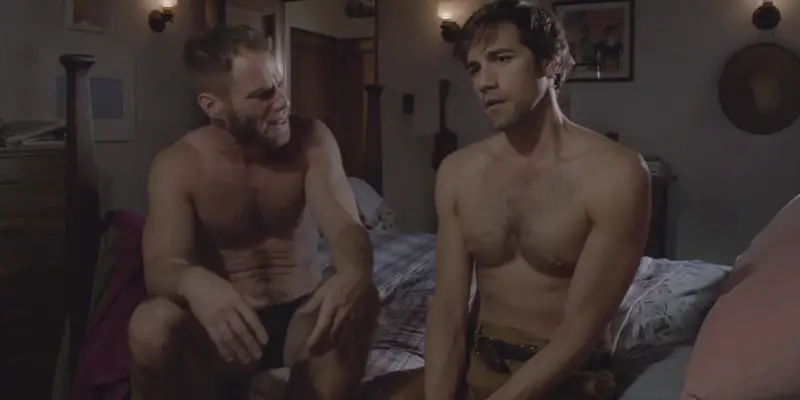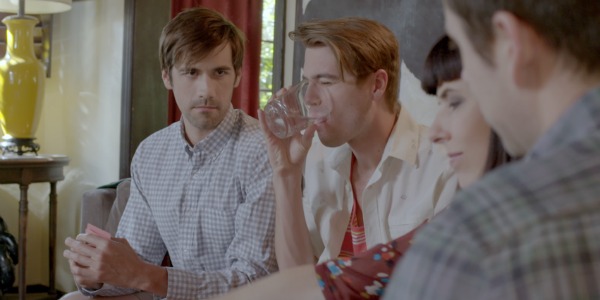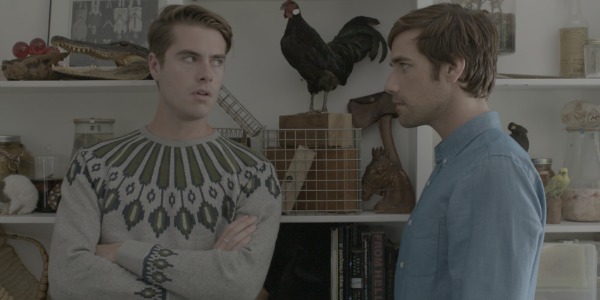YOU’RE KILLING ME: An LGBT Horror Comedy With Plenty Of Jokes But No Scares

Alistair is a 25 year old writer based in Cambridge.…
For a horror sub-genre that is frequently criticised for misogynist overtones, it is surprising how many gothic filmmakers haven’t combined the LGBT themes inherent in horror with the rampant violence of slasher film more frequently before.
You’re Killing Me is a horror-comedy that puts the emphasis on the comedic elements, its many detours into slasher film never feeling either shocking or as amusing as the film around them. But it is unique for a film in this sub-genre to remove any subtext about societal fears among gay people in contemporary society and just make a straightforward horror-comedy with no deeper thematic resonance.
A horror comedy with no emphasis on horror
It is also unique for a film with no deep thematic resonance, especially within horror-comedy, to be as effective as it is: it frequently provides laughs generated from pop-culture related non-sequiturs at such a high rate that should put far bigger budget productions to shame. Its dark comic premise may form the narrative backbone, but every scene of rampant bloodshed only highlights the limitations of the film’s budget.
It is a classic mistaken identity comedy. After murdering a date in cold blood, Joe (Matthew McKelligon) chances upon a YouTube comedy sketch on his date’s laptop, becoming obsessed with one of the lead actors, deluded George (Jeffery Self) in the process. Stalking his victim one night, he introduces himself as a serial killer, only for George to love his dark sense of humour and immediately the pair hit it off. What follows is a week of George’s friends and acquaintances disappearing, which in the self-absorbed world of You’re Killing Me, is presented with a shrug of disinterest until its too late.
If the serial killer elements were kept off-screen and the comedy of errors was consistently the main focus, this would be a far more effective approach to a tired genre staple. Instead, we are treated to poorly-rendered “dream sequences” that offer fake blood and guts – a constant reminder that the film is trying to be horrifying as well as funny, if only ever succeeding at one of these. In fact, the horror scenes ultimately detract from what laughs there are to be had.

The dream sequences are even more distracting when taking director Jim Hansen’s previous role as a costume designer for films including both chapters of Kill Bill into consideration. As somebody previously tasked with helping co-ordinate the style of a movie, it is unusual for him to make a film so visually ugly in places, instead of limiting the style to coincide with the low budget.
LGBT-themed slasher films are difficult to find. The most high-profile is A Nightmare on Elm Street 2: Freddy’s Revenge, a film that includes no female victims and a homoerotic subtext so blatant its director balked at the idea it could ever be described as mere subtext. However, the sexuality of its lead character, a subversion of the “final girl” trope, is never mentioned; if older horror movies with gay thematic content were defined by their closeted nature, contemporary ones are defined by their sheer lack of subtext.
You’re Killing Me is upfront about the sexuality of its characters, but cheerfully renders them irrelevant. The focus is how their obnoxious, self-involved attitudes are so all-encompassing, they don’t realise they have ushered a serial killer into their social circle. Thematically, this film doesn’t need to delve deeper; it is a surprising case of a comedy based around a high-concept of mistaken identity that never runs out of steam during its brisk running time. This doesn’t mean it works as a horror-comedy, as the scares just aren’t there. But read as a deliciously dark comedy, it is a success.
A distinctive brand of dark comedy
One problem with recent comedy releases is their reliance on over-used pop-culture gags. Sacha Baron Cohen’s recent monstrosity The Brothers Grimsby, for example, piles on references either dated, over-used or both. You’re Killing Me similarly has a fondness for pop-culture jokes and the reason they work is because they don’t utilise obvious joke targets.

Nor do they try to make them somehow offensive, or add some element of shock value into name-checking a famous face; a rarity in dark comedy, which is constantly trying to push the boundaries of good taste. An amusing recurring joke is about the characters having confusion over the correct pronunciation of chat show host Sally Jessy Raphael; it’s simple, effective and doesn’t try to shock. Even more effective is that it uses a dated cultural reference, but makes it funny and worth its inclusion in the screenplay – it even has a pay-off in the third act.
Contrasted with recent flop Dirty Grandpa, where Robert De Niro claimed he would “rather drink Queen Latifah’s shit from a hot air balloon”- one of that film’s many examples of a dated pop-culture reference stuck in for no other reason to namecheck a celebrity in the same sentence as something unspeakably vulgar. It isn’t shocking or funny, just tired and dated. There is a misassumption among comedy screenwriters in Hollywood that for dark or offensive comedies, every gag has to read as shocking. The laughs in You’re Killing Me are never of the tired “shocking” kind, even if the premise of the film is inherently so.
Conclusion
The characters in You’re Killing Me are all obnoxious and annoying, which doesn’t work to the film’s detriment; in fact, it all adds up to a final, successful subversion of a common slasher trope. For many viewers though, spending time with any of these clueless, talentless idiots will be a thankless task, but with a premise that never runs out of steam and an efficient gag-rate, You’re Killing Me is a cult gem waiting to be found.
What other subgenre LGBT films can you think of?
You’re Killing Me is released on VOD in the US on March 8. All international release dates are here.
https://www.youtube.com/watch?v=Hwz2QD28Ajg
Does content like this matter to you?
Become a Member and support film journalism. Unlock access to all of Film Inquiry`s great articles. Join a community of like-minded readers who are passionate about cinema - get access to our private members Network, give back to independent filmmakers, and more.
Alistair is a 25 year old writer based in Cambridge. He has been writing about film since the start of 2014, and in addition to Film Inquiry, regularly contributes to Gay Essential and The Digital Fix, with additional bylines in Film Stories, the BFI and Vague Visages. Because of his work for Film Inquiry, he is a recognised member of GALECA, the Gay & Lesbian Entertainment Critics' Association.












